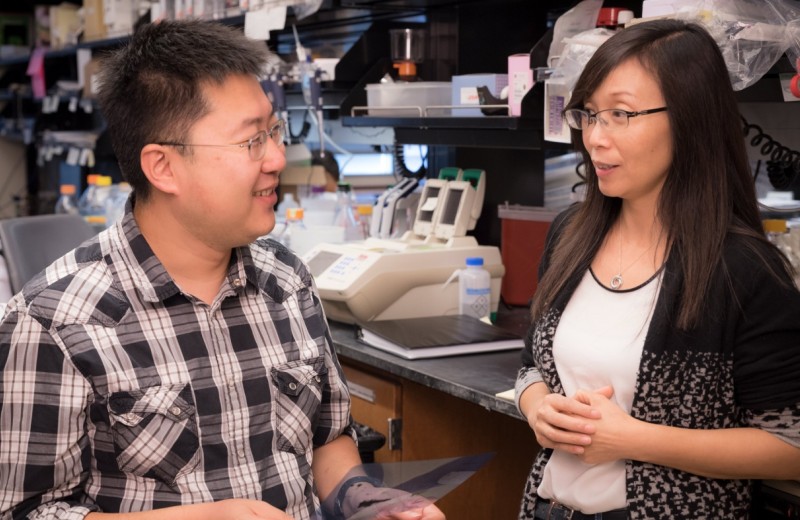Gladstone NOW: The Campaign Join Us on the Journey✕

Li Gan, PhD, fostered collaborative relationships and made outstanding scientific contributions to her field, leading to her new leadership role at Gladstone. [Photo: Chris Goodfellow, Gladstone Institutes]
Li Gan, PhD, has been appointed as associate director of the Gladstone Institute of Neurological Disease (GIND). Her appointment follows her nearly 20-year history with the Gladstone Institutes, in which she developed fruitful collaborative relationships, made outstanding scientific contributions, and supported the efforts of trainees and junior faculty.
As an integral member of the leadership team at Gladstone, Gan will work closely with Lennart Mucke, MD, director of GIND, to represent the Institute and provide guidance that will support Gladstone’s mission and values.
“During my time at Gladstone, I have watched the Institute grow into a remarkable organization,” said Gan, who is also a senior investigator at Gladstone and a professor of neurology at the University of California, San Francisco (UCSF). “I look forward to working with Lennart and other members of the Institute to chart our path into the future.”
Gan’s research focuses on the molecular mechanisms that underlie the loss of functional neurons in neurodegenerative diseases, including Alzheimer’s disease and frontotemporal dementia. More specifically, she studies the mechanisms that are common to neurodegenerative processes: the accumulation of protein aggregates and miscommunications between neurons and glia, especially microglia.
Recently, Gan received an $11 million grant from the National Institute of Neurological Disorders and Stroke (NINDS) to establish a center to study how the protein tau affects neurons in the brain and how it causes disease, particularly frontotemporal dementia. Tau has also been implicated in Alzheimer’s disease and a range of other neurodegenerative disorders. The center includes scientists at UC Santa Barbara, Albert Einstein College of Medicine, UCLA, and UCSF.
Gan received a bachelor’s degree in physiology from China’s Peking University and a PhD in cellular and molecular physiology from the Yale University School of Medicine. Later, she completed postdoctoral training at Yale University School of Medicine, Harvard Medical School, and the Gladstone Institutes. Gan has received several awards, including a Glenn Award for Biological Mechanisms of Aging and an Inge Grundke-Iqbal Award for Alzheimer’s Research.
“Over her years at Gladstone, Li has established herself as an innovative investigator and exemplary mentor,” said Mucke. “I am thrilled to now have her in this new position and know that Gladstone will benefit greatly from her leadership.”
Support Discovery Science
Your gift to Gladstone will allow our researchers to pursue high-quality science, focus on disease, and train the next generation of scientific thought leaders.
New Study Resolves Debate about How the Brain’s Immune Cells Regenerate
New Study Resolves Debate about How the Brain’s Immune Cells Regenerate
Gladstone scientists investigate how microglial cells maintain their population
News Release Research (Publication) Alzheimer’s Disease Neurological Disease Gan LabOne Copy of a Gene May Be Worse Than None at All
One Copy of a Gene May Be Worse Than None at All
A team of researchers shows that missing one copy of the TREM2 gene can exacerbate Alzheimer’s disease pathology
News Release Research (Publication) Alzheimer’s Disease Neurological Disease Gan Lab AgingGrowing Human Brain Cells in the Lab
Growing Human Brain Cells in the Lab
Scientists develop a cheaper, quicker, and more reliable stem cell–based technology to facilitate drug discovery
Gan Lab Stem Cells/iPSCs Alzheimer’s Disease



